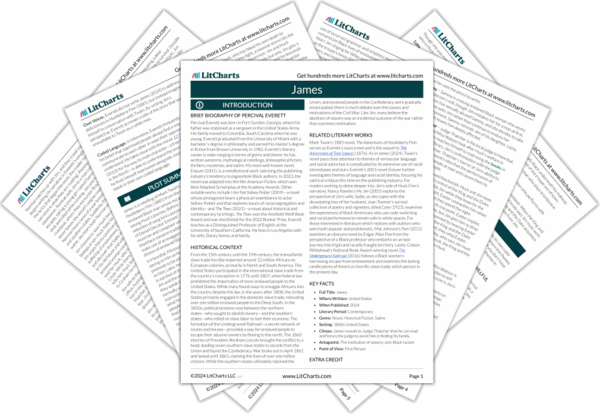Books represent the intellectual freedom that cannot be taken away by the institution of slavery. Before the novel begins, Jim has taught himself and other enslaved people to read using the books in Judge Thatcher’s library. While it is worth noting that he obtains this knowledge without his enslaver’s permission, the fact remains that Jim is able to conceal what he has learned by maintaining a façade of ignorance. Maintaining this façade falsely reassures Jim’s white enslavers that he is incompetent, which in turn grants him the freedom to expand his knowledge in secret. After discovering the robbers’ stash of books on their skiff, Jim reflects further on the power of reading: “[Reading] was a completely private affair and completely free and, therefore, completely subversive.” Because no one can tell whether Jim is merely seeing the words or comprehending their meaning, the act of reading falls outside the realm of his enslavers’ control or even perception. Jim’s reading also allows him to engage in discourse with the logic of his own enslavement, as seen when he imagines arguments with Voltaire and John Locke. Reading the works of such writers lets Jim debate them from the position of an equal, a status from which he is barred in the physical world. At the novel’s climax, Judge Thatcher is appalled to discover Jim’s literacy, affirming that the act of reading subverts white expectations of Black intelligence and is a means for enslaved people to reclaim some portion of their stolen liberty.
Books Quotes in James
“Well, yes, but all men are equal. That’s my point. But even you have to admit the presence of, shall we call him—it—the devil, in your African humans.” Voltaire adjusted his position and held his hands to the fire.
“You’re saying we’re equal, but also inferior,” I said.
“I’m detecting a disapproving tone,” he said. “Listen, my friend. I’m on your side. I’m against the institution of slavery. Slavery of any kind. You know that I am an abolitionist of the first order.”
“Thank you?”
“You’re welcome.”

Unlock explanations and citation info for this and every other James quote.
Plus so much more...
Get LitCharts A+Then I wrote my first words. I wanted to be certain that they were mine and not some I had read from a book in the judge’s library. I wrote:
I am called Jim. I have yet to choose a name.
[…]
But I will not let this condition define me. I will not let myself, my mind, drown in fear and outrage. I will be outraged as a matter of course. But my interest is in how these marks that I am scratching on this page can mean anything at all. If they can have meaning, then life can have meaning, then I can have meaning.
At that moment the power of reading made itself clear and real to me. If I could see the words, then no one could control them or what I got from them. They couldn’t even know if I was merely seeing them or reading them, sounding them out or comprehending them. It was a completely private affair and completely free and, therefore, completely subversive.
I had already come to understand the tidiness of lies, the lesson learned from the stories told by white people seeking to justify my circumstance. […] And so, after all these books, the Bible itself was the least interesting of all. I could not enter it, did not want to enter it, and then understood that I recognized it as a tool of my enemy. I chose the word enemy, and still do, as oppressor necessarily supposes a victim.
“What you’re saying is that if someone pays you enough, it’s okay to abandon what you have claimed to understand as moral and right.”
“When you put it that way,” he said.
“When I put it that way what?”
“They wanted a constitution that would justify their behavior. If I hadn’t written it for them, someone else would have. What in the world would be different if that had happened?”
I looked at him. “You tell me,” I said.
“Imagine it all as a state of war,” Locke said. “You have been conquered, and so long as the war continues, you shall be a slave.”
“When does the war end?” I asked.
“Does it end? That’s the question. Who gets to say that it’s over? A war continues until the victor says it’s over.”
“If I am in a war, then I have the right to fight back. That follows, doesn’t it? I have a right, perhaps a duty, to kill my enemy.”
“Well, now.”
“Why on earth would you think that I can’t imagine the trouble I’m in? After you’ve tortured me and eviscerated me and emasculated me and left me to burn slowly to death, is there something else you’ll do to me? Tell me, Judge Thatcher, what is there that I can’t imagine?”
[…]
“Are you going to kill me?”
“The thought crossed my mind. I haven’t decided. Oh, sorry, let me translate that for you. I ain’t ’cided, Massa.”
I had never seen a white man filled with such fear. The remarkable truth, however, was that it was not the pistol, but my language, the fact that I didn’t conform to his expectations, that I could read, that had so disturbed and frightened him.












